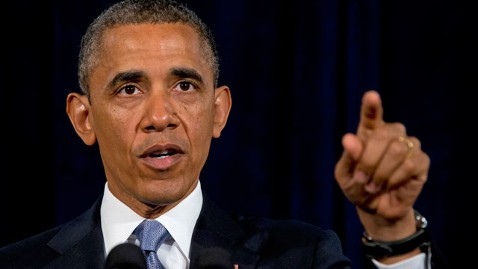Obama: 'Nobody Is Listening to Your Phone Calls'
SAN JOSE, Calif. - President Obama today dismissed the "hype" surrounding his administration's secret surveillance of Americans' phone records and the nation's Internet activity and defended the programs as key to protecting national security.
"Nobody is listening to your telephone calls," the president told reporters in his first public comments since the programs were disclosed.

Image credit: Evan Vucci/AP Photo
"They are not looking at people's names, and they're not looking at content. But by sifting through this so-called metadata, they may identify potential leads with respect to folks who might engage in terrorism," he said.
If the intelligence community wants to listen to a phone call, Obama said, they need approval from a federal judge.
The president also said that data being collected on emails and Internet activity is targeted at foreign nationals and not U.S. citizens.
Related: Government Has Access to Verizon Data
Obama stressed that members of Congress have repeatedly been informed of these programs.
"The programs that have been discussed over the last couple days in the press are secret in the sense that they're classified, but they're not secret in the sense that when it comes to telephone calls, every member of Congress has been briefed on this program," he said.
"The relevant intelligence committees are fully briefed on these programs. These are programs that have been authorized by broad, bipartisan majorities repeatedly since 2006. And so I think at the outset, it's important to understand that your duly elected representatives have been consistently informed on exactly what we're doing," he added.
Obama said that he welcomes the debate that has been sparked by the recent revelations.
"One of the things that we're going to have to discuss and debate is how [we're]striking this balance between the need to keep the American people safe and our concerns about privacy, because there are some trade-offs involved. And I welcome this debate. And I think it's healthy for our democracy. I think it's a sign of maturity," he said.
"It's important to recognize that you can't have a hundred percent security and also then have a hundred percent privacy and zero inconvenience. You know, we're going to have to make some choices as a society," he said.
Related: Obama to Press China on Cybersecurity
What he does not welcome, however, are national security leaks.
"There's a reason why these programs are classified," he said. "There is a suggestion that somehow any classified program is a quote-unquote 'secret' program, which means it's somehow suspicious. But the fact of the matter is, in our modern history there are a whole range of programs that have been classified."
"If every step that we're taking to try to prevent a terrorist act is on the front page of the newspapers or on television, then presumably the people who are trying to do us harm are going to be able to get around our preventive measures. That's why these things are classified," he said.